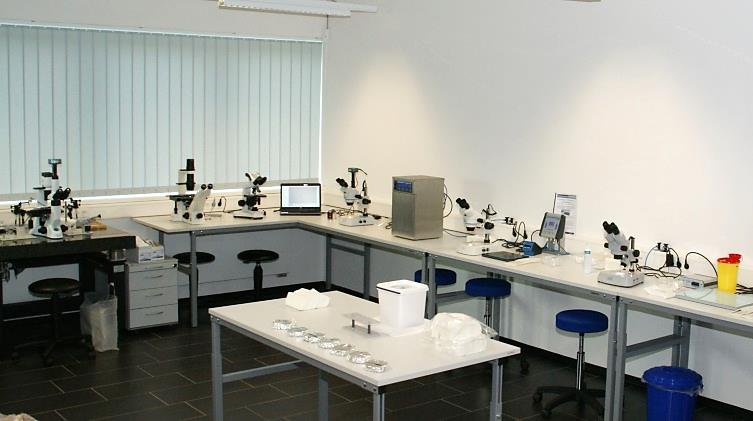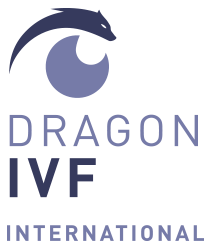Projects
Selection of REPORTS ABOUT COMPLETED Hands-on TRAININGS
Dragon IVF has already conducted several successful hands-on trainings in newly built IVF clinics worldwide. You can read reports about individual training projects here. We would like to thank all organisations, colleagues and participants.
- IVF laboratories are set up worldwide according to an individual situational situation and staff can be trained and trained in their own facilities
- On request, the Dragon IVF International team can be brought to any desired country to treat patients together with the local IVF team
- Dragon IVF supports preparations of international congresses and construction of practical exhibition stands
1. DSF-Labcon Training Center
After a very long period of planning and evaluation, in 2014 we finally succeeded in giving Germany the opportunity for individual hands-on IVF training.
In cooperation with DSF Labcon, a permanent training centre has been established in the premises of Labotect GmbH in Göttingen, where necessary techniques of fertility treatment and laboratory work of assisted reproduction are intensively trained and taught by our trainers. The aim is to teach the trainees the craftsmanship and theoretical skills of assisted reproduction within a very short period of time. This is caused by small working groups.
Der Pilotkurs über 5 Tage in der DSF Labcon wurde mit 5 MTAs Deutschlands durchgeführt und erfreute sich einer sehr guten Resonanz.
Bei Interesse melden sie sich direkt bei der DSF Labcon GmbH in Rosdorf/Göttingen.
Universität Göttingen
Anfang 2006 bis Ende 2007 fand die erste Evaluierungsstudie zu dem Nutzen, der Durchführbarkeit und der Effizienz einer Trainingseinheit für assistierte Reproduktion statt. Dabei sollten folgende Fragestellungen geklärt werden:
- Gibt es ausreichend Nachfrage zum Erlernen der handwerklichen Techniken in einem angeleiteten Hands on Training?
- Ist es möglich, Personen mit einer Basisausbildung im naturwissenschaftlichen Bereich in einem begrenzten Zeitraum die Techniken der assistierten Reproduktion zu vermitteln?
- Kann man die Industrie als Natural-Sponsoren innerhalb dieses Projektes von dem Nutzen überzeugen?
- Können wissenschaftliches Arbeiten und Schulungen von Anfängern im gleichen Labor stattfinden?
Die Antworten ergeben sich aus den folgenden Erfahrungen.
Im Institut für Tierzucht und Haustiergenetik in Göttingen wurde ein IVF Labor den neusten Standards entsprechend eingerichtet. Hierzu gehörten ein schwingungsfreier Tisch, Varolab, ein Mikroskop Observer Fa. Zeiss, ein Laser mit Computersoftware Octax mit Eyeware MTG, ein Mikromanipulator Fa. Luigs und Neumann, ein Werktisch mit integrierter Heizplatte, Varolab, ein Kleininkubator C 42, Labotect, ein mittelgroßer 60 l Inkubator Fa. Labotect, ein CO 2 Messgerät 4010 Fa. Labotect.
Weiterhin kamen Verbrauchsmaterialien sowie Demonstrationsutensilien der Fa. Biomedical Instruments, Cook, Medicult, Heike Janssen und Vitrolife zum Einsatz.
Dr. Nazik Karrar (Sudan) gained all the craftsmanship you need in an IVF lab in a 4-week training course. Through this intensive training, she was able to present high pregnancy rates in her home laboratory in the UAE.
Stephanie Buhtz (Germany) obtained the title of Master of Agricultural Sciences.
(From the Institute for Animal Breeding and Pet Genetics of the Georg-August-University Göttingen; Survivability of cryopreserved mice embryos after intermediate storage at -18°C or -79°C, Master’s thesis in the Department of Reproductive Biology and Biotechnology presented by Stephanie Buhtz Göttingen in July 2007)
Mr. A. Al Yacoub (Jordan) obtained a doctorate in agricultural sciences. Vitrification of mice blastocysts with the OPS method with the addition of various (sucrose concentrations Lecture meeting of the DGfZ and GfT on 26/27 September 2007 in Hohenheim sacrose concentrationsA). Al Yacoub, M. Gauly, J. Reischl, W. Holtz)
Dr. Moataz (Egypt) was able to carry out many publications with help of the laboratory.
Mr. Gerado Padilla (Mexico) gained the basics of micromanipulation through a 4-day ICSI training.
In summary, it is possible to unite different companies within a project. The success of training is persons have been reached.
group sizes as well as trainers who have been in the profession for more than 10 years.
The pilot course over 5 days in the DSF Labcon was conducted with 5 MTAs in Germany and enjoyed a very good response.
If you are interested, please contact DSF Labcon GmbH in Rosdorf/Göttingen.
The answers are derived from following experiences.
At the Institute for Animal Breeding and Pet Genetics in Göttingen, an IVF laboratory was set up in accordance with the latest standards. These included a vibration-free table, Varolab, a microscope Observer Fa. Zeiss, a laser with computer software Octax with Eyeware MTG, a micromanipulator company Luigs and Neumann, a work table with integrated heating plate, Varolab, a small incubator C 42, Labotect, a medium-sized 60 l incubator Fa. Labotect, a CO 2 measuring instrument 4010.
Consumables and demonstration utensils from Biomedical Instruments, Cook, Medicult, Heike Janssen and Vitrolife were also used.
In this laboratory, master and doctoral students were thus able to complete scientific work with optimal laboratory equipment and thus achieve comprehensible good results. At the same time, courses for interested persons of all disciplines of laboratory work of assisted reproduction could be carried out. The industry was able to clarify questions for its products in the shortest possible time with experienced specialists and a permanent industrial exhibition was available to all.
The laboratory represented a symbiosis that brought maximum benefits to science, industry and the sole proprietorship of Dragon IVF International.
The laboratory came to its full utilization by using the students. The evaluation study has been successfully completed.
Ashgabat (Turkmenistan)
In Ashgabat, Turkmenistan’s capital, a Medical City has developed, which now also supervises the field of gynecology in particular assisted reproduction. Dragon IVF International has been consulted to provide expertise in this area.
In a first training, 4 people (1 andrologist, 1 embryologist, 1 gynecologist and 1 geneticist) were brought to Göttingen for a 5-day training to train the people of the discipline of assisted reproduction and to prepare them for their future workplace.
The further support training then took place on site in Ashgabat.
Dragon IVF has taken over the planning of the IVF laboratory with cryopreservation, andrology, embryology and embryo culture as well as genetics laboratory. A five-year plan identified the equipment and consumables that are most suitable for the situation. In order to invest valuable funds in a meaningful way, Dragon IVF International has taken over the complete planning and individual analysis, the import of equipment and materials was carried out through the company Hospitalia International. In a first laboratory acceptance, the devices were installed, optimally positioned and the premises optimized according to their requirements (March 2007). The gynaecological part was also put into operation and even the first patient consultations took place. A television broadcast documented these first steps in detail.
The first batch of more than 40 IVF patients was performed in May 2007. The stimulations and preliminary examinations took place on site in Ashgabat, but an intensive exchange of the examination results of patients was conducted. Upon arrival in Ashgabat, patients were treated with ICSI, IVF, ICSI TESE, cryopreservation and blastocyte culture for 18 days. All necessary protocols and techniques have been established.
A meeting of 150 gynaecologists took place at the Ene Mahri Hospital. The local staff were trained according to the workplaces or the basic knowledge acquired in Göttingen was deepened in the laboratory. Step by step, the laboratory specialists and doctors were introduced to their future tasks.
In a period of more than four weeks (27.02. – 30.03.2010) 74 couples were introduced as part of a fertility treatment. A large team of IVF labs, genetics, gynecologists, nurses and anesthesiologists ensured an uncomplicated batch history. The techniques of blastocytene culture, vitrification and family balancing techniques have been firmly established.
Due to the high standard of setting up the IVF laboratory, it is envisaged to establish a training center for techniques of assisted reproduction. Patients from the surrounding area should also be given the possibility of treatment.
Overall, one can speak of a future-oriented project, which is only made possible by a high willingness to cooperate between the team members
A new batch over 4 weeks took place already in September 2010.
After another smaller batch took place in September and October, it was found that the team in Ashgabat has advanced far in laboratory and medical training. Another small batch in March 2011 was carried out, where there were very good pregnancy rates. Thus, this project in Ashgabat is considered to have been successfully completed.
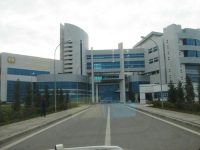
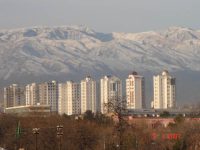
For the first time in Turkmenistan’s medical practice, doctors of Ene Myahri Mother and Child Health Care Center in Ashgabat have started extra-corporal (artificial) fertilization surgeries. Treatment of all forms of infertility is one of the specialization areas of the Center.
“Leading German specialists from Dragon IVF International having expertise in training techni al personnel for extra- corporal laboratories have visited the Center’s ECF Laboratory. In the interview to the correspondent of Turkmenistan.ru, reproductive embryologist Dr. Manuela Ropiter-Sharfenstein, telling about their work with the Turkmen colleagues, said: “We are starting the second, main stage of our close and fruitful cooperation – practical realization of received skills. First, the Turkmen doctors attended a special training course in Gttingen, Germany, afterwards, we visited Turkmenistan. In March 2007, when we visited Ashgabat for the first time, our Turkmen colleagues successfully underwent the training on using the up-to-date equipment and started preliminary treatment of patients”.
According to Ms Manuela Ropiter-Sharfenstein, as of today, 35 couples are on a waiting list for the surgery.
“We are looking forward to the long-term cooperation with our Turkmen colleagues. We will support the laboratory in Ashgabat and do our best to maintain it”, the German specialist said expressing confidence Turkmenistan has big potential in developing reproductive medicine.”
Abu Dhabi / DPZ
In the period from 18.-28. September 2009, participants from Abu Dhabi and the German Primate Center Göttingen were successfully trained in the skills around the IVF laboratory. The results will be summarized here as an example of the other training courses.
During the training week, many different aspects of Assisted Reproduction could be performed, and the methods demonstrated at the latest state of the art. It was possible to involve a large number of different animal species in the training through a great deal of coordination, so that even the extraction methods of the gametes could be trained, and anatomical aspects were investigated and compared with the new techniques. Eggs and sperm from pigs, cattle, rabbits, mice and monkeys were available. In summary, the course of the training can be summed up as being absolutely instructive for the participants.
It has been pointed out several times that the participants have never experienced such a training, as it was actually a hands-on training. Mr. Ravindra Kumar has already attended events around the world and according to him, he has never been able to experience and learn so many different methods in such a short time. This statement has encouraged us to prepare for further hands-on training.
In addition, a symposium was held at Hardegsen Castle. Through 2 lectures of Prof. Hans Wilhelm Michelmann, where on the one hand IMSI and on the other hand extended culture were the topic, the corresponding audience from research and industry was confronted with exciting theamtics and provided for a lively discussion. A total of 25 participants could be welcomed. There is no question that there is a need for such genuine hands-on training, as well as the benefits and learning success.
Es wurde mehrfach hervorgehoben, dass die Teilnehmer noch nie ein solches Training erlebt haben, da es sich hier tatsächlich um ein Hands-on-Training handelte. Herr Ravindra Kumar hat weltweit schon Veranstaltungen besucht und nach seinen Aussagen war er noch nie in der Lage, so viele verschiedene Methoden in solch kurzer Zeit zu erleben und zu erlernen. Diese Aussage hat uns bestärkt, uns für weitere Hands on Schulungen und Trainings vorzubereiten.
Zusätzlich wurde ein Symposium auf der Burg Hardeg zu Hardegsen abgehalten. Durch 2 Vorträge des Herrn Prof. Hans Wilhelm Michelmann , wo zum einen die IMSI und zum anderen die Extended culture Thema waren, wurde das entsprechende Publikum aus Forschung und Industrie mit spannenden Theamtiken konfrontiert und sorgete für eine rege Diskussion . Insgesamt 25 Teilnehmer könnten hierzu begrüßt werden. Es steht außer Frage, dass sowohl der Bedarf solcher echten Hands on Trainings besteht als auch der Nutzten und der Lernerfolg offensichtlich waren.
Nörten-Hardenberg, Workshop
The course “Hands-on Methods in the IVF Laboratory” was carried out on the initiative of the Working Group for Reproductive Medicine and Endocrinology (ÄRE) under the auspices of the German Society for Reproductive Medicine (DGRM) in 2011. The Lower Saxony Medical Association has certified this course with 50 points under the medical direction of Prof. Bals-Pratsch from Regensburg. From 12.-16. January 2011, six gynaecological biologists with a focus on gynaecological endocrinology and reproductive medicine from all over Germany and Austria met to gather impressions of the methods used in their own laboratories and thus to better understand the problems, working time expenditure and organisation in the laboratory. Artificial insemination and embryo transfer may only be carried out by doctors (Embryo Protection Act 11). Thus, the specialist is responsible for this IVF performance. Therefore, it is extremely important for this leading position to understand all the handles in the laboratory. In a four-day course, many laboratory methods were carried out and practiced in a “showroom”, furnished in the conference hall of the Burghotel zu Hardenberg in Nörten-Hardenberg, starting with egg puncture via egg hunting, egg denudation, sperm preparation, ICSI, laser techniques, cryopreservation, etc.
All methods were demonstrated in the animal model. Ovaries of slaughterhouse sows and cattle were available for puncture and ejaculates could be obtained from the insemination station in Göttingen both fresh and frozen. The start of the practical exercises was a visit to the stallion station Eicke in Immensen/Einbeck. Here, on the example of a horse, were shown the possibilities of semen harvesting, sperm processing possibilities and dotted in the laboratory the slaughter ovaries of beef and pig.
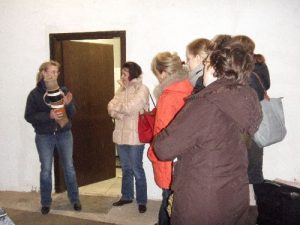 For all participants, this area of reproductive medicine was very inspiring, so that techniques in other mammals and humans were reflected very intensively and conclusions about treatment options in humans were discussed.
After eggs were searched at six stereolupen workstations in the “show laboratory” in the Burghotel, the different possibilities of “egg handling” were tried out, these eggs were then available for the ICSI, which was then carried out at two different ICSI workstations. In addition to the ICSI, lasers, spindle and zona imaging, IMSI as well as blastomeerenbiopsies were demonstrated and also performed on the bovine and porcine eggs.
For all participants, this area of reproductive medicine was very inspiring, so that techniques in other mammals and humans were reflected very intensively and conclusions about treatment options in humans were discussed.
After eggs were searched at six stereolupen workstations in the “show laboratory” in the Burghotel, the different possibilities of “egg handling” were tried out, these eggs were then available for the ICSI, which was then carried out at two different ICSI workstations. In addition to the ICSI, lasers, spindle and zona imaging, IMSI as well as blastomeerenbiopsies were demonstrated and also performed on the bovine and porcine eggs.
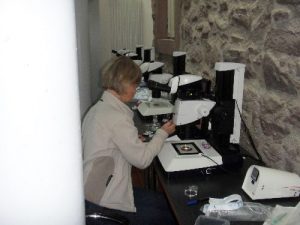 A real highlight was the life demonstration of the extraction of mouse gametes, cygots and embryos. Under camera control, participants were able to witness on-screen how gamete and embryonic stages were won through delicate craftsmanship by employees of the Göttingen Max Planck Institute for Experimental Medicine. Embryos were taken into cultivation and were available for further “handling” techniques and assessments under the stereo magnifier. The course was supplemented by three evening lectures by Prof. Dr. H. W. Michelmann (University Medicine Göttingen, Dr. Dr.M. Wiarda (“Valuable Sales”, Hardegsen) and Dr. P. Najudu (German Primary Center Göttingen). With yoga and singing bowl therapy, the participants were actively taught how positively these relaxation techniques are related to IVF therapy.
A real highlight was the life demonstration of the extraction of mouse gametes, cygots and embryos. Under camera control, participants were able to witness on-screen how gamete and embryonic stages were won through delicate craftsmanship by employees of the Göttingen Max Planck Institute for Experimental Medicine. Embryos were taken into cultivation and were available for further “handling” techniques and assessments under the stereo magnifier. The course was supplemented by three evening lectures by Prof. Dr. H. W. Michelmann (University Medicine Göttingen, Dr. Dr.M. Wiarda (“Valuable Sales”, Hardegsen) and Dr. P. Najudu (German Primary Center Göttingen). With yoga and singing bowl therapy, the participants were actively taught how positively these relaxation techniques are related to IVF therapy.
The course has brought a lot of joy to all supporting contributors, participants and myself. Participants were given many important insights that could lead to better understanding sensitivity and complexity of methods in the IVF laboratory. What is certain is that very intensive contacts and new friendships developed, which will definitely lead to cooperative exchange in routine.
Jordan Farah Hospital, Jordanien
Hassan Al Haris, Laboratory and Science Needs / Taawon-Dragon IVF International
Within 2 days, a collaboration between Dragon IVF International and Taawon Labaratory & Scientific Supplies made it possible to establish the IMSI technology at Farah Hospital in Jordan. In this intensive workshop, a local IVF team of 4 embryologists was trained on the newly installed Nikon microscope system with integrated micromanipulation system.
Microscope
Here it seemed very advantageous that selection of sperm under IMSI conditions and subsequent ICSI with the same microscope is possible (simple switching of the DIC in MC mode and vice versa). On screen, a detailed demonstration of various sperm morphology (from fresh human ejaculates) was carried out and quality criteria were discussed in detail with experienced trainer Mrs Helena Angermaier, who personally carried out more than 500 IMSI cases each year.
Training:
- Quality A: no vacuoses, inconspicuous shape of the head and center piece, movable.
- Quality B: Some small vacuos, inconspicuous to slightly different head shape, movable.
- Quality C: Large vacuoles, changes in head shape, movable..
IMSI-Configuration
- Inverted Nikon Ti-S Microscope
- Nikon NAMC Lens 10x-40x
- Nikon Plan 100X N.A. 0.85 IMSI Lens with DIC Set
- NarishNT-88-V3 Micromanipulation Set
Very interesting was the sensational resolution with dry IMSI. The process was created due to lack of immersion oil and proved to be a much more elegant method, image quality of the Nikon microscope is beautiful, so the system can be a real option in this technology. The 2nd day of the IMSI workshop consisted mainly of the preparation of the IMSI, which was discussed and demonstrated.
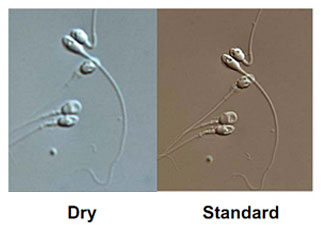
- Demonstration of production of a glass bottom shell with a sensitive
- Applying and correct placement of sperm suspension on microdroplet plate for selecting individual sperm
- Correct handling of the injection pipette and manipulation under enlargement IMSI
- Information about possible sources of error, troubleshooting
In the last section, the laboratory manager and colleagues were instructed to practice the IMSI independently, and it was even possible to perform a routine case correctly under supervision. The Farah Hospital team was therefore able to confirm that they could perform the IMSI in the routine.
Kasachstan Almaty
Shortly before the lockdown of the COVID-19 Pandemic 2020, I (Dr. Manuela Ropeter-Scharfenstein) was able to provide professional support to Gynemed and Global Atlas in Almaty, Kazakhstan.
During a three-day stay in Almaty, former capital and second largest city of Kazakhstan (approx. 2 million inhabitants), it was a great honour for me to be able to give a lecture here and to accompany interesting questions at the highest level in hands-on workshops together with the team. For the IRM Center’s IVF team (www.IRM.kz) are highly competent personnel, with whom it was also an incredible enrichment for me to look at and discuss questions from many sides.
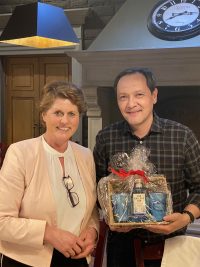
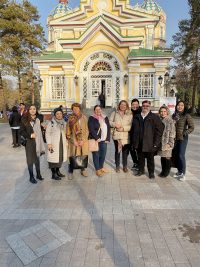
Apart from this highly professional track of work in the IVF lab, I was immediately accepted and integrated as part of this great IVF family. Together with Susanne Wächter, Dr. Julia Heinzmann, participants of Labotect and Martin Stein of the Global Atlas company, we were able to experience a lot in a very short time and convince us of the beauty of the country. It is not an exaggeration to say that this stay has generated a lot of new impulses in me and I am especially very grateful to Mrs Wächter, as the initiator of this project, to be able to take part in this event. I would also like to thank Mr Stein and his team for their excellent translations.
Special thanks go to the Jakupov family and in particular to the Director of the Clinic of Reproductive Medicine in Almaty Mrs. Tamara M. Jussubaliyeva, for the really great trust, deep insights into the course of IVF processes and the truly friendly stay in the great world of Kazakhstan.
A project that everyone involved will surely remember for a long time to come.



